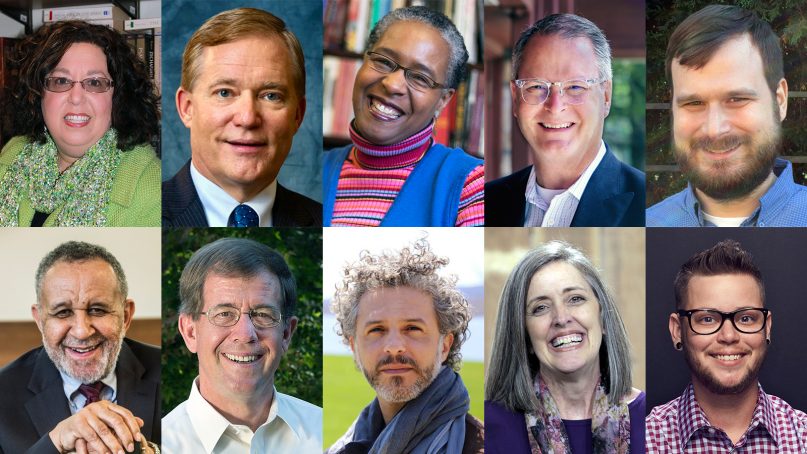(RNS) — A few months ago, United Methodist Bishop Karen Oliveto predicted that 2019 will be the year her denomination decides “all are necessary members” amid a long-running dispute over sexuality.
By engaging Scripture, tradition, experience and reason together, she predicted, United Methodists will “provide a critical witness to a fractured, hurting world that differences do not have to lead to division and unity is not the same thing as uniformity.”
United Methodists will find out soon if the bishop’s predictions are correct.
This weekend the global denomination’s decision-making body, known as the General Conference, will gather for a special session in St. Louis to discuss plans to move forward despite deep disagreement over ordaining LGBTQ clergy and performing same-sex weddings.
Heading into that special session this weekend, Oliveto, the first openly LGBTQ bishop in the United Methodist Church, told Religion News Service, “My prayer for this special session of General Conference is that the Holy Spirit will lead us to a place of healing, reconciliation and unity that will surprise us all.”
We asked pastors, bishops, delegates, activists and other United Methodists in the United States to share what they expect — and hope — to happen at the special session, too. Here’s what they suggest we keep an eye out for.
The views expressed in these submissions, which have been edited for length and clarity, do not necessarily reflect those of Religion News Service.
The Rev. Adam Hamilton: Live in the tension

Adam Hamilton. Photo courtesy of Church of the Resurrection
It requires patience, humility and grace to look at people with whom you disagree on an issue or theological point and say, “You are still my brother or sister.” It requires a willingness to say, “I don’t agree with you here, but I value what you bring to the table, and I need you.”
It is much easier to want to leave and find a place without the tension, where everyone agrees with you, than to stay in a place with people with whom you disagree. But I believe we’re all poorer when we do that.
This is one reason why I support the One Church Plan recommended by two-thirds of our bishops. It attempts to navigate a middle way between the left and the right, giving space for both the traditionalists and the progressives. Some will leave because of it. But I hope many more will say, “We can continue to live in the tension, valuing, while disagreeing with, those on the other side.”
The Rev. Adam Hamilton is senior pastor of the United Methodist Church of the Resurrection in Leawood, Kan., where he preaches to more than 8,000 people each week. An expanded version of his comments can be found on his website.
The Rev. Alex da Silva Souto: ‘Do no harm’
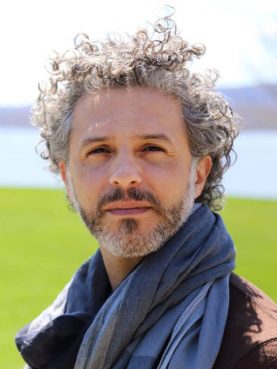
The Rev. Alex da Silva Souto. Photo by the Rev. Won Tack Lee
United Methodists have been actively debating about the human dignity and divine worth of LGBTQIA+ (lesbian, gay, bisexual, transgender, queer, intersex, asexual) people since 1972, the year I was born. While “self-avowed, practicing homosexual” is the identity criminalized by the UMC Book of Discipline, the targeted groups have been much broader.
Transgender and gender-nonconforming people, for example, have also been discriminated against and punished. This nearly half-century-old debate has been prolonged because the powers that be refuse to do the work of understanding, accepting and celebrating the diversity, complexities and wonder of human sexuality.
Which is why I and thousands of other United Methodists support the Simple Plan, which would strike from our Book of Discipline all discriminatory language against LGBTQIA+ people. After decades of systemic harm, the only solution is returning to the first rule of United Methodism: “Do no harm.” The Simple Plan proposes exactly that. We must first stop the spiritual/physical harm against LGBTQIA+ people, and only then can we have a real conversation about “human sexuality.”
We might walk away from St. Louis without final answers, but stopping the harm, as a first step, is certainly better than more of the same. We are deciding on matters of life and death for LGBTQIA+ communities around the world; may we allow the Holy Spirit to move and revive all that needs movement and revival.
The Rev. Alex da Silva Souto is co-convener of the United Methodist Queer Clergy Caucus, one of the leaders of UM-Forward and a General Conference delegate from the New York Conference. He pastors New Milford United Methodist Church in New Milford, Conn.
The Rev. Beth Ann Cook: Face the depths of division
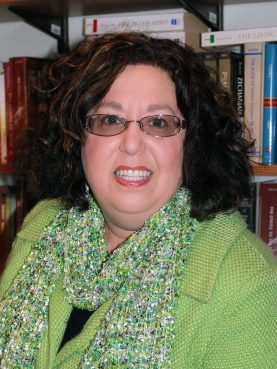
The Rev. Beth Ann Cook. Courtesy photo
I am praying that St. Louis will bring the moment when we finally acknowledge and face the depth of our division. Our theological division is not limited to the issue of human sexuality. Sexual ethics are the presenting problem for a deeper theological division in our church. It is time to stop kicking the can down the road. But making this decision will be painful.
The Commission on a Way Forward spent countless hours looking at every possibility. There is no perfect plan. Passing any of the plans will violate someone’s deeply held convictions in such a way that they will feel unable to remain part of our denomination.
If a local church cannot in good conscience stay in the United Methodist Church, I pray that we will live out Matthew 7:12 by passing a gracious exit path that allows them to take their property with them. Such an exit path would need to provide for unfunded liabilities, including our pension obligations. But I want those who feel that they cannot remain in our church, to be able to be faithful to Christ’s call as they understand it. I want us to be known as people who love one another deeply.
The Rev. Beth Ann Cook is an ordained elder in the Indiana Annual Conference and senior pastor at Logansport First United Methodist Church. She has been elected to serve as a General Conference delegate three times and also serves on the Commission on General Conference.
Ben Weger: ‘Continue being the church God has called us to be’

Ben Weger. Courtesy photo
As a person who is called to ministry and unable to pursue that call in the church that baptized me, I cannot support the One Church Plan. I was fired from my position at a United Methodist church for being a transgender man and the pastor who fired me sits on the board of ordained ministry in my annual conference. The One Church Plan does nothing to guarantee any progress for me in this process unless I want to move away from my family and community.
Which is why I support the Simple Plan, a plan that was introduced by a group separate from the Commission on a Way Forward and removes all discriminatory language from the Book of Discipline — something I believe is essential.
If I were to make a prediction, however, I would say, with whatever hopefulness I have left, that the UMC will pass the One Church Plan.
I am fortunate to currently serve within a United Methodist congregation that welcomes and affirms all people and the truth is, on March 3 we will gather together and continue being the church God has called us to be. Whatever change may come, I believe we will carry on in mission to build and be God’s kindom on earth.
Ben Weger is the worship leader at Allendale United Methodist Church in St. Petersburg, Fla., and a seminary student at Iliff School of Theology.
Scott D. Miller: Churches should choose their own paths
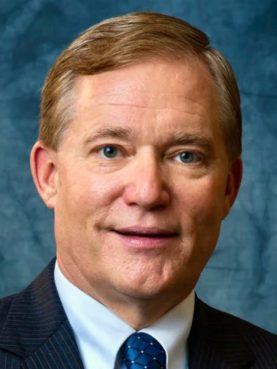
Scott D. Miller. Photo courtesy of Virginia Wesleyan University
As a lifelong Methodist and president of a Methodist-affiliated institution, my primary concern is doing what is right and including and representing the spiritual needs of all members of the church regardless of orientation. My loyalty lies with what I consider to be the true Christian way in my heart.
There are three approaches being considered at the special session. I believe the most logical approach is the Connectional Conference approach. This model would allow individual churches to choose their own path. Other options are likely to result in further division and controversy, and consequently, a denominational crisis that will greatly affect funding, resources and long-term viability.
My hope and prayer is that, whatever happens, we will honor the United Methodist Church’s “profound commitment to the sacred worth of all persons and to social justice,” as we have done previously in our positions on civil rights, women’s rights and other issues.
Scott D. Miller is president of Virginia Wesleyan University in Virginia Beach. A college president for over 28 years, he was previously president of Bethany College, Wesley College and Lincoln Memorial University. He is a lifetime Methodist and is a member of the board of directors of the National Association of Schools and Colleges of the United Methodist Church.
The Rev. Traci C. West: Demand ‘uncompromised respect’
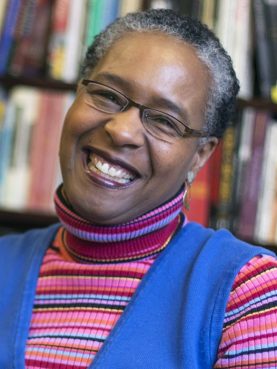
Traci C. West. Courtesy photo
I hope that the United Methodist Church’s 2019 special session offers a much-needed demonstration of its unambiguous opposition to hate by removing all of the anti-LGBTQ discriminatory language from the Discipline. Therefore, I support the Simple Plan.
I pray that the UMC’s 2019 special session will offer an alternative Christian message that demands uncompromised respect for the equal human worth and dignity of lesbian, gay, bisexual, transgender, queer and heterosexual persons across all racial, national, ethnic and tribal backgrounds. I hope that the gospel mandate of Jesus Christ who came to set at liberty the oppressed will prevail, not as empty or hypocritical Christian rhetoric that masks the desire for property and power and thus merely continues the tradition of our white Methodist slave master and colonizing forebears. Instead I hope this gospel mandate prevails in actual liberative practices and policies of the 2019 church.
The Rev. Traci C. West is professor of Christian ethics and African-American studies at Drew University Theological School in Madison, N.J. She is an ordained elder in the New York Annual Conference of the United Methodist Church.
The Rev. Carolyn Moore: Exit ramp options are needed
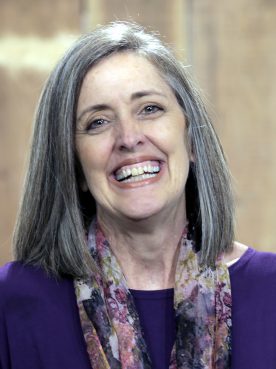
The Rev. Carolyn Moore. Courtesy photo
For 40 years, the United Methodist Church has developed its waiting muscles. We’ve been waiting for decades for a decision to stick around issues of human sexuality that will release us to move on from this conversation. The last three years have been an especially intense time of waiting. With less than a week to go, I sense that none of us is sure how this will shake out. There seems to be a split opinion around three options — either one of the two more likely plans up for consideration will succeed (One Church or Traditional), or no decision will be reached at all due to a bureaucratic logjam.
My deep hope — more than which plan wins the day — is that an exit ramp will become part of any plan approved. Right now, only one of the three plans proposed provides for an “exit ramp” — a way out for pastors and churches that does not punish them for their choice to leave the “connection” with property and position intact. A “gracious exit” was recommended for all plans by the commission that proposed the three options up for debate; but with one exception, the exit ramp option has been removed. That is discouraging. I so want our tribe to do this differently than others who have gone before us. There is no winning if we are all biting and devouring each other on the other side of this. No one, regardless of their theological position, should be held hostage by a system they cannot live in wholeheartedly.
The Rev. Carolyn Moore is pastor of Mosaic United Methodist Church in Evans, Ga., and vice chair of the Council of the Wesleyan Covenant Association. She also writes a blog titled The Art of Holiness.
The Rev. Gil Caldwell: ‘Why not change our minds?’
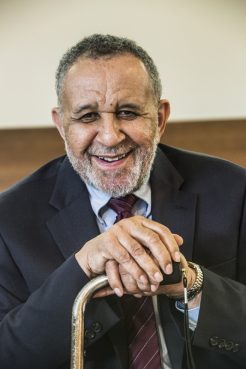
The Rev. Gil Caldwell. RNS photo by Travis Long
Once, Methodists used the Bible to ban dancing, card playing, the drinking of alcohol and divorce. The Bible has not changed, but United Methodists have. Why not change our minds about homosexuality?
I grew up learning about Negrophobia, the fear of blacks. Homophobia is a fear of homosexuality. Politicians and church leaders have been known to use the deep-seated phobias of people, link them to the Bible and justify discrimination against blacks and homosexuals. We call this a “weaponizing” of the Bible. My hope is that the delegates to the General Conference will end biblical weaponizing of same-gender-loving persons and their advocates.
What does this moment mean to me as a United Methodist? What does it mean for the rest of the church?
That the UMC will become a church that dares to dare to be the inclusive and just church it has not been. Recognizing the flaws, yet hopes that all people have, will never be completely filled in this life.
The Rev. Gilbert H. Caldwell is a clergy member of the Mountain Sky Conference. Caldwell was one of the founders and the second national chairperson of Black Methodists for Church Renewal and a former staff member of the United Methodist Church General Commission on Religion and Race. He was active in the civil rights movement, including the March on Washington, Mississippi Freedom Summer, Selma to Montgomery March and Poor People’s Campaign.
John Lomperis: Be cautiously optimistic
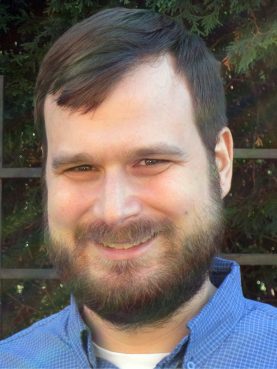
John Lomperis. Courtesy photo
I hope and pray that my fellow delegates join me in adopting the Modified Traditional Plan. This is the only plan that faithfully affirms clear biblical and historic ecumenical and Wesleyan teaching about God’s good design and boundaries for marriage and sex.
There is little mystery about what the so-called One Church Plan would do to our denomination in the long run. Despite the misleading name, it is significantly more radical than the liberalizing policies that split apart other mainline denominations. This favored plan of U.S. bishops would bring an even greater split to our denomination. Adopting the so-called One Church Plan would lead to making the United Methodist Church become no longer united, no longer Methodist and not much of a church.
I am cautiously optimistic that enough of my fellow delegates will vote for the same standards of biblical faithfulness and Wesleyan accountability that we supported at the 2016 General Conference. This could set us on a course of renewed biblical faithfulness, renewed Wesleyan accountability for our leaders, renewed respect for the global church, renewed compassion for ALL people and hopefully reducing some of the reckless and pastorally harmful covenant-breaking we have seen in recent years.
John Lomperis is a lay delegate from the Indiana Conference of the United Methodist Church and director of UM Action, a program of the Institute on Religion and Democracy and an unofficial evangelical caucus group within the denomination.
Bishop Scott Jones: Change is coming
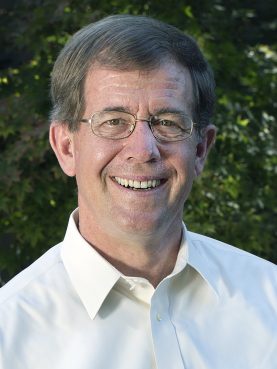
Bishop Scott Jones. Courtesy photo
No matter what is decided, I have no doubt that some sort of change is coming to the United Methodist Church. I believe God has a great future planned for the Wesleyan Movement, and I plan to be active in leading the church forward.
At the end of this process, the UMC may not look the same in structure or scope, but we are not going to change in our mission. I believe the more we focus on our mission, the stronger we will be.
I recognize that this is a significant moment in the life of our denomination. My prayer is that we will one day look back upon this time in our history and see that we conducted ourselves in a manner that exemplified our love for God and for each other as we focus on the mission that Christ has given us.
I believe the global church is watching and waiting to see how we respond. I pray at the end of the day they see our unity around our mission to make disciples of Jesus Christ for the transformation of the world above anything else.
The Rev. Scott J. Jones currently serves as the resident bishop of the Texas Annual Conference of the United Methodist Church. He regularly offers commentary on his website, ExtremeCenter.com.
